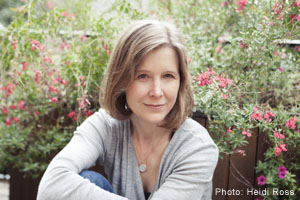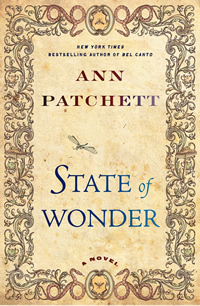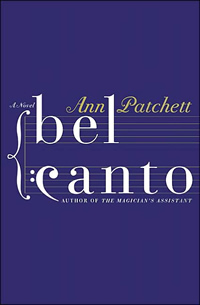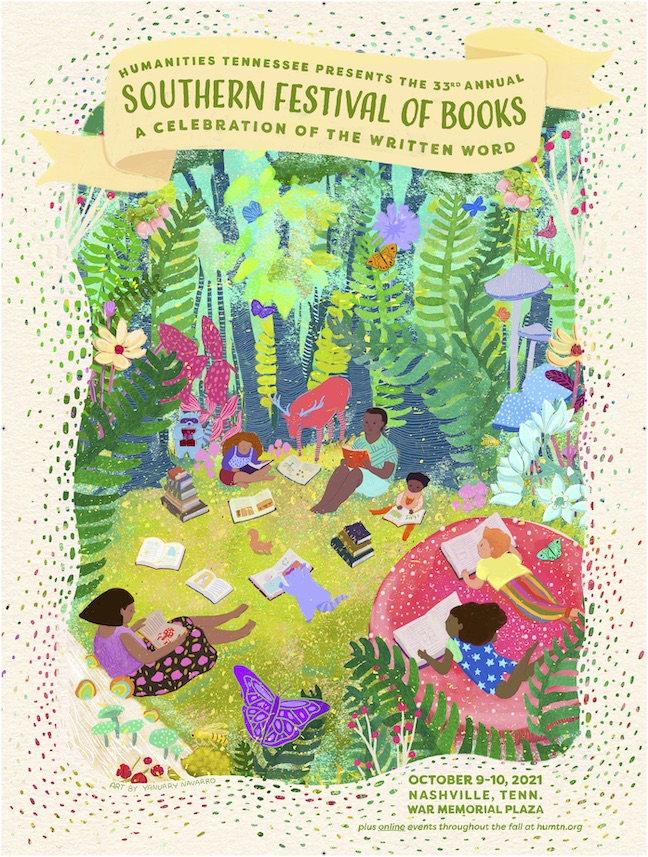Against the One True Story
Ann Patchett talks with Chapter 16 about her new novel and about why “we can all stand a little less reality”
Though she spent her childhood summers visiting her father in India, Marina Singh, the protagonist of Ann Patchett’s forthcoming novel, State of Wonder, has come home to Minnesota; she is at ease only on the wide prairie, in flat, cool, windy spaces as far from the sweltering jungle as she can reasonably get. But then the pharmaceutical company she works for sends Anders Eckman, a friend and fellow researcher, to the Amazon to gauge the progress of a fertility drug being developed by one of Marina’s former professors. Annick Swenson is a demanding, difficult woman who deflects all attempts to monitor her research. When Anders dies in her secret camp in the Amazon, and Dr. Swenson offers few details about—and no explanation for—his death, the company redoubles its efforts to discover what’s really going on in that trackless jungle lab they’ve been funding for years. Heading into the Amazon in search of news about her friend, Marina finds herself confronting both her childhood nightmares and the professor who failed to come to her aid during an emergency surgical procedure she botched as a medical resident.
State of Wonder features cannibals and snakes and a Heart of Darkness-like odyssey into an unknown world that leads inexorably to a confrontation with Marina Singh’s past. It is thus unlike any other novel Ann Patchett has ever written, and yet it has all the hallmarks of a Patchett novel, nonetheless: written in lucid, almost transparent prose, it offers a page-turning tale about a set of characters who are intensely original and particular, but who are at the same time so recognizable as to be nearly universal. Ann Patchett writes so utterly convincingly about the interior lives of her characters that even a novel set in the snake-draped jungle seems to be a novel about us, too. Small wonder, then, that it has received starred reviews from Publisher’s Weekly, Library Journal, and even the persnickety Kirkus Reviews, which pronounced it “thrilling, disturbing and moving in equal measures—even better than Patchett’s breakthrough Bel Canto.”
Prior to the publication of State of Wonder, Patchett offered Chapter 16 readers a sneak peak at the novel and answered questions about the book via email.
 Chapter 16: You are famous for defying the workshop dictum to “write what you know.” And yet this book, though it is set in the Amazon, and though its protagonist is a native Minnesotan born to an American mother and an Indian father, seems—at least to one who knows only the broad outlines of your life—to be your most personal novel yet. Marina’s father, like yours, lived far away throughout her childhood; like Marina, you fell in love with an older man; like Marina, you have reached your forties without having children. Are those facts mere coincidences, superficial similarities?
Chapter 16: You are famous for defying the workshop dictum to “write what you know.” And yet this book, though it is set in the Amazon, and though its protagonist is a native Minnesotan born to an American mother and an Indian father, seems—at least to one who knows only the broad outlines of your life—to be your most personal novel yet. Marina’s father, like yours, lived far away throughout her childhood; like Marina, you fell in love with an older man; like Marina, you have reached your forties without having children. Are those facts mere coincidences, superficial similarities?
Patchett: The thing about fiction is you could look at just about any book and figure out how it’s autobiographical. To write a book about the Amazon and malaria and everlasting fertility and then find out that people are wondering if the father was like my father because my parents got divorced when I was a kid isn’t anything I really care about. It isn’t important to the book itself. I draw from my life, I draw from other people’s lives (my husband is a doctor), I make things up, I do things I immediately forget about. I think when a writer is very young and writes a book that is in some way connected to her own life (Tea Obreht was born in Croatia! Her novel is set in Croatia!), it mercifully gives the publicist a hook with which to gain attention. But when you’re forty-seven and you’ve written a lot of books, the question of autobiography is less compelling. Book after book, people want to know what parts really happened, and I just don’t write that kind of book. Actually, the part of this story for which I have a deep personal connect is having certain teachers whom I worshipped [but] who didn’t know me from Adam.
Chapter 16: Oh, dear. Speaking of teachers, I had planned another question about biography— this time related to “The Mercies,” the gorgeous, gorgeous essay you wrote for the current issue of Granta about the nun at St. Bernard’s Academy who taught you to read. In it, you realize that the grudge you’ve held for years, decades, against Sister Nena is “a bit akin to Helen Keller holding a grudge against Annie Sullivan for yanking her around.” In State of Wonder, Marina, too, many years later encounters the professor whose memory torments her. But you’re saying there’s no connection between the novel and the essay? Your friendship with Sister Nena wasn’t the impetus for this novel?
Patchett: You read Granta! That’s so great. I don’t read Granta, and one of my best friends works there (just in case you’re wondering how I got the essay published). But the answer is no, my friendship with Sister Nena wasn’t the impetus for the novel as far as I know. Wouldn’t it be great to be able to dissect the novelist’s brain (after death) and figure out where the root of an idea comes from?
 The impetus [for State of Wonder] comes from the Henry James novel, The Ambassadors, which later morphed into the Joseph Conrad novella, Heart of Darkness. In both books, character A is sent off to find character B, whom no one has heard from in a long time. Then I started to think that character B would be character A’s former teacher. That got me thinking about Allan Gurganus and Grace Paley, whom I worshipped and who had no attachment to me at all; or Angela Carter, whom I didn’t worship but was really scared of. Sister Nena and I have a very close friendship these days, a friendship of equals. I still feel anxious and eager to please when I see Allan.
The impetus [for State of Wonder] comes from the Henry James novel, The Ambassadors, which later morphed into the Joseph Conrad novella, Heart of Darkness. In both books, character A is sent off to find character B, whom no one has heard from in a long time. Then I started to think that character B would be character A’s former teacher. That got me thinking about Allan Gurganus and Grace Paley, whom I worshipped and who had no attachment to me at all; or Angela Carter, whom I didn’t worship but was really scared of. Sister Nena and I have a very close friendship these days, a friendship of equals. I still feel anxious and eager to please when I see Allan.
Chapter 16: Actually, I didn’t mean to ask about an event-for-event, life-to-art correlation. I was trying to get at something about how this book seems to allow you to explore, in a very imaginative way, the full complexity of what it means to be a child who misses her father, what it means to be a woman who has seemingly ruled out the possibility of children, what it means to be a successful professional who spent many years completely misinterpreting the words or actions of a crucial teacher. That’s really what I meant by “personal.” You have never been a terrorist or an opera singer or Japanese businessman, either, but Bel Canto still seems to me like the work of a writer who had fairly recently and absolutely transcendently fallen in love. Not true?
Patchett: But see, for me Bel Canto had almost nothing to do with falling in love. That was just some ancillary plot line going on beside a much larger story about art and society. Everyone brings something different to the story and everyone reads a different book; that’s exactly why you shouldn’t look to the personal life of the author to find The One True Story. Picture the two of us standing next to a compost pit. We have a shovel; we’re turning over dirt. You say to me, “Is that an eggshell from 1975?” And I peer at it and I’m thinking, maybe it’s an eggshell. I mean, I’m sure they are eggshells in there. Is it the 1975 eggshell? I really have no idea.
I just don’t see this novel as intensely personal. When I’m writing something I have experienced, say a character who is missing her father, I think, great, I have some experience there I can tap into, say the sadness of airport departures, but I’m not working through something; I’m not using the scene as an opportunity to sort out my own emotional life. For example, I’ve had the experience of being massively sick in a hotel room and waking up on a strange tile floor and thinking I was going to die, so if that happens to my character, I have some firsthand details which just makes it a little easier to write. Think of it more in terms of cheating.
Chapter 16: I get that Bel Canto has something to say about art and society, just as Run has something to say about race and identity— and that all your novels, going back to The Patron Saint of Liars—pick up on very large themes or concerns. And yet, as I’m reading, I don’t get the sense of anything remotely polemical going on behind the story; I don’t note an authorial agenda. To the contrary, I read with the sense that the characters come first, that you start with people, plop them into an interesting situation, and then see what happens. So it surprises me to learn that you think of the love story in Bel Canto as ancillary. Do you also think of the thoughts that plague Marina— about her lost father, about her love for a man she will almost certainly outlive, about the professor whose actions and failures to act completely alter Marina’s future, etc. —as ancillary to a novel that explores big questions about what’s universal, and what isn’t, about being human, and that also has something to say about the nature of the pharmaceutical industry and of a market-based method of developing new drugs?
Patchett: May I just say these questions are getting kind of hard and I’m glad you’re not a cop and I’m glad I didn’t steal something. When I say ancillary I suppose I mean it was ancillary, or secondary, to my thinking about the book. In Bel Canto I thought, this is a story about confinement and how people change. Now, what are some of the activities that people in confinement can do to kill time: cook, listen to music, learn a language, have sex. That’s different from setting out to write a love story.
The story of Marina’s relationship with her father (as opposed to my relationship with my father), and her affair with Mr. Fox (which is hardly a compelling plot point) were means of fleshing out her character, giving her some back story, but they don’t define the plot. On the other hand, her relationship with doctor Swenson and that unfortunate C-section seem completely primary to me, the engine that drives the story. I don’t think this is a book about big pharma, but then again I don’t even think that The Constant Gardener is a book about big pharma. Do you know how much I love John LeCarre?
 And even as I say all this, I have to say that none of it matters. The themes of the book are the ones the reader assigns to them.
And even as I say all this, I have to say that none of it matters. The themes of the book are the ones the reader assigns to them.
Chapter 16: Let’s talk about that unfortunate C-section. It is, of course, the engine that drives the story, and coming to understand it—and coming to understand Annick Swenson’s response to it afterward—completely changes the way Marina views her own past and Dr. Swenson herself. After Dr. Swenson has absolved Marina of the guilt she’s carried for decades, you write: “Marina sat down in a chair beside the desk, and there it went, the burden of a lifetime, taken.” Almost everyone, it seems, has one teacher whose opinion, good or bad, significantly drives the plot of their lives. Why do you think teachers so often have this effect?
Patchett: My father once told me when I was starting my student teaching at Iowa, “A third of your students will love you, a third will hate you, and a third won’t be able to remember your name.” I’ve found this a pretty accurate breakdown. Authority figures shape us, and some much more powerfully than others. Had I committed a few crimes, I probably would have been shaped by my parole officer. It’s a matter of authority figures, parents, teachers, parole officers, clergy, the people who are in charge of us when we are vulnerable, eager to please, unformed. Those are the people who have power in our lives, so we’re all going to have a profound relationship to at least one of them.
Chapter 16: “The Mercies” reminds me that your first published work was nonfiction. Even as you’ve turned out these wonderful novels over the years, you’ve also been writing nonfiction: a memoir about your friendship with Lucy Grealy, a book advice for graduates, and dozens of essays for magazines and newspapers. Any chance you’ll collect the shorter pieces into a book? Any other memoirs in the works?
Patchett: A dear friend of mine, Niki Castle, moved to Nashville from New York last year and she worked for me for about six weeks until she found a real job. It was my one experience of having an assistant. What she did was read and catalog all of my essays, pull the ones she liked the best, and organize them into a book. When I went through it myself I agreed with all of her choices. That said, it is still sitting there. I’ve written a lot of personal essays and published them in big-circulation magazines and never batted an eye, but somehow reading them together made me uncomfortable. It would be such an easy book for me to finish; I just haven’t been able to do it. I love writing essays, I absolutely love them, and a lot of people have asked me to do this book. Maybe I will, I don’t know.
As for writing another straight-up memoir, I doubt it, but then you never know the topics life will hand you. I certainly had no intention of writing Truth & Beauty, but when Lucy died I felt like there was nothing else to do. Sometimes I think it would be great to write a Tracy Kidder-style book, just attach myself to a person or a place and write about it. The years go by, and I have a lower and lower threshold for personal information (see above) and that’s not because I’m a particularly private person. I just feel the world is choking on disclosure. I think we could all stand a little less reality, and a little more creativity.
[Click here to read an excerpt from Ann Patchett’s forthcoming novel, State of Wonder.]


